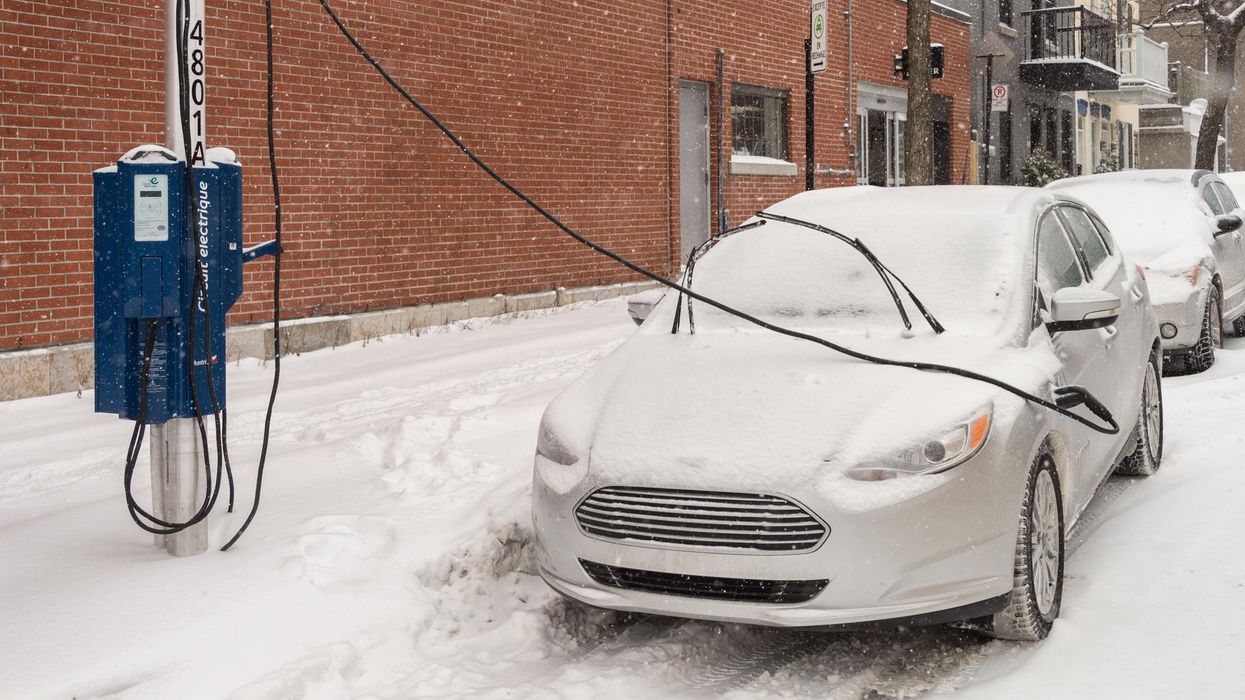Canada Is Moving Forward With Its Plan To Ban Gas-Powered Cars & Changes Start In 2026
An electric vehicle mandate would change the way Canadians buy cars. 🚗

An electric car charges in Montreal.
The way Canadians buy new cars is set to change, as the federal government has taken another step towards its plan to ban the sale of gas-powered cars in Canada.
On Wednesday, December 21, Environment Minister Steven Guilbeault laid out the government's plan to move towards an electric vehicle mandate by 2035.
Under the proposed plan, the sale of all new gas-powered vehicles would be banned in Canada, as part of the country's wider goal of cutting pollution and fighting climate change.
The proposed regulations — which will impact passenger cars, SUVs, and pickup trucks — will require at least 20% of new vehicles sold in Canada to be zero emission by 2026.
By 2030, at least 60% of new vehicles sold in Canada must be electric, with this rising to 100% by 2035.
This means, essentially, that it will become increasingly difficult to purchase a new, gas-powered car in Canada over the next decade.
By 2035, the sale of new gas-powered vehicles will be banned altogether.
The ban has been brought forward, as officials had initially set a goal for 2040. It was moved five years earlier in an effort to "take another important step on the road to net zero."
Manufacturers and importers could face penalties under the Canadian Environmental Protection Act if they don't meet the targets laid out by the feds.
While it will become harder to buy brand new gas-powered cars from a dealership or showroom over the coming years, the changes are not likely to impact the private sale of non-electric vehicles.
The hope, though, is that it will become increasingly difficult to purchase and sell cars that are not zero emission, therefore encouraging Canadians to consider greener alternatives instead.
To help people make the change, the government has announced a series of investments to make buying and maintaining electric vehicles easier.
As well as investing in 50,000 new EV charging stations across Canada, the programs that provide Canadians with financial support to buy a zero-emission vehicle (ZEV) will be renewed.
Sharing the update on Wednesday, Environment and Climate Change Canada said, "The shift to zero-emission vehicles is good for our workers; for our automotive, battery, and mining supply chains; and for our economy, creating jobs and prosperity for generations of workers to come."
"The shift is good for our environment, keeping our air clean," a statement added.
In a notice shared last year, Environment and Climate Change Canada acknowledged that, if the country is to achieve its climate goals, emissions will need to be reduced from medium- and heavy-duty vehicles as well.
It says discussions are ongoing with regard to utility vans, delivery trucks, buses, dump trucks and long-haul tractor-trailers, as well as other commercial vehicles.
- Canadians Can Get Up To $5K From The Feds To Buy A More Environmentally Friendly Car ›
- Here's How You Can Get Money & Incentives From The Government To Get A New Car In 2022 ›
- New Gas-Powered Cars Are Set To Be Banned In Canada & Here's Everything You Should Know ›
- You Can Get Up To $5,000 From The Government To Get A New Car This Year — Here's How It Works - Narcity ›